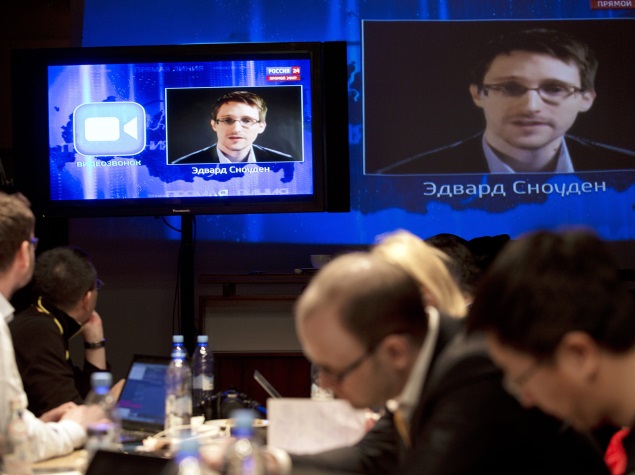- Home
- Internet
- Internet News
- Snowden Documents Reveal UK Spies Stored Journalists' Emails: Report
Snowden Documents Reveal UK Spies Stored Journalists' Emails: Report

Britain's electronic spy agency GCHQ tapped emails of journalists at some of the world's biggest media organisations, The Guardian reported on Monday.
The report said GCHQ gathered emails from journalists at the BBC, The Guardian, Le Monde, NBC, The New York Times, Reuters, The Sun and The Washington Post.
The emails were among 70,000 gathered in less than 10 minutes in 2008 by the spy agency, Britain's equivalent of the US National Security Agency, according to The Guardian's analysis of documents leaked by former US intelligence contractor Edward Snowden.
The emails were gathered in one of many taps of the fibre-optic cables that form the Internet's backbone, and were available for viewing by any cleared staff on GCHQ's intranet, according to the report.
The Snowden documents appeared to show the messages were collected while testing a new tool designed to sift through tapped data to identify relevant chunks.
It is not revealed in the leaked documents if journalists were deliberately targeted, the report said.
(Also See: Ex-UK Spy Chief Says Accord Needed With Tech Firms to Stop Terrorism)
A spokesman for GCHQ told the paper: "All of GCHQ's work is carried out in accordance with a strict legal and policy framework, which ensures that our activities are authorised, necessary and proportionate, and that there is rigorous oversight, including from the secretary of state."
The spy agency considers journalists as "a potential threat to security" according to internal security advice cited by The Guardian, with investigative journalists listed as a threat alongside terrorists and hackers.
The report was published amid pressure to limit the British government's ability to spy on journalists' communications, after revelations police accessed phone records to identify journalists' sources within the police.
Over 100 editors of British newspapers published a joint letter to Prime Minister David Cameron on Monday calling on the government to stop law enforcement officials viewing journalists' phone records without a warrant from a judge.
"It is in everyone's interests that the state recognises the over-arching importance of protecting the confidentiality of journalists' sources," said the letter.
"Public sector whistleblowers will not come forward to journalists in future if law enforcement agencies have the power to view journalists' phone records at will."
Cameron renewed calls for increased powers of surveillance in the wake of attacks by Islamist gunmen in Paris that left 17 dead, saying attackers should be denied a "safe space" to communicate.
For the latest tech news and reviews, follow Gadgets 360 on X, Facebook, WhatsApp, Threads and Google News. For the latest videos on gadgets and tech, subscribe to our YouTube channel. If you want to know everything about top influencers, follow our in-house Who'sThat360 on Instagram and YouTube.
Related Stories
- Samsung Galaxy Unpacked 2025
- ChatGPT
- Redmi Note 14 Pro+
- iPhone 16
- Apple Vision Pro
- Oneplus 12
- OnePlus Nord CE 3 Lite 5G
- iPhone 13
- Xiaomi 14 Pro
- Oppo Find N3
- Tecno Spark Go (2023)
- Realme V30
- Best Phones Under 25000
- Samsung Galaxy S24 Series
- Cryptocurrency
- iQoo 12
- Samsung Galaxy S24 Ultra
- Giottus
- Samsung Galaxy Z Flip 5
- Apple 'Scary Fast'
- Housefull 5
- GoPro Hero 12 Black Review
- Invincible Season 2
- JioGlass
- HD Ready TV
- Laptop Under 50000
- Smartwatch Under 10000
- Latest Mobile Phones
- Compare Phones
- Redmi Turbo 4
- Vivo Y200+
- Lava Yuva 2 5G
- OnePlus Ace 5
- OnePlus Ace 5 Pro
- Oppo A5 Pro 5G
- Vivo Y29 5G
- Honor Magic 7 RSR Porsche Design
- Asus Zenbook S 14
- MacBook Pro 16-inch (M4 Max, 2024)
- Honor Pad X9 Pro
- Honor Pad V9
- boAt Enigma Gem
- boAt Enigma Daze
- Sony 65 Inches Ultra HD (4K) LED Smart TV (KD-65X74L)
- TCL 55 Inches Ultra HD (4K) LED Smart TV (55C61B)
- Sony PlayStation 5 Pro
- Sony PlayStation 5 Slim Digital Edition
- Blue Star 1.5 Ton 3 Star Inverter Split AC (IC318DNUHC)
- Blue Star 1.5 Ton 3 Star Inverter Split AC (IA318VKU)
















